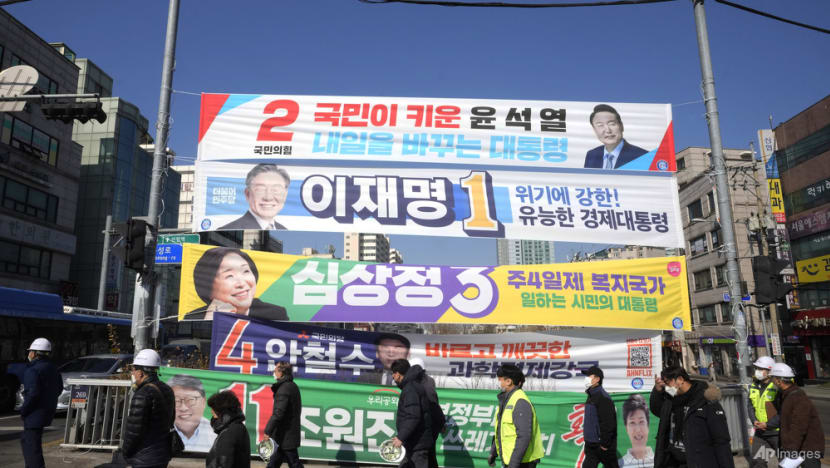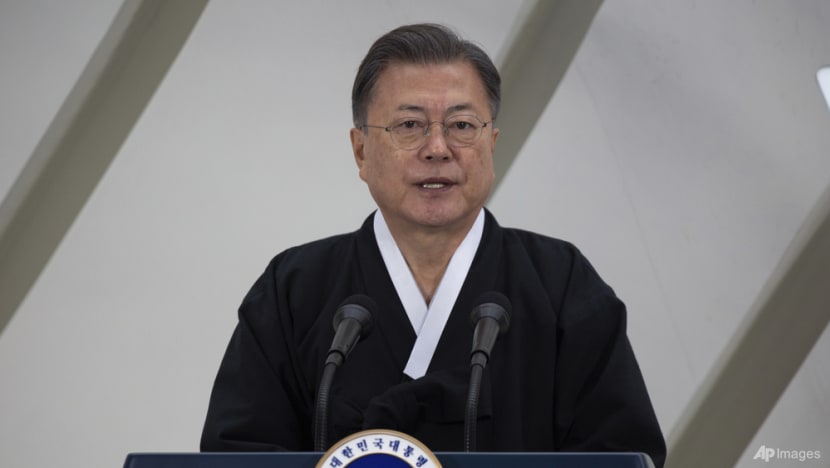Commentary: This South Korean presidential election isn't what voters expected
Looking to make a comeback after their scandal-ridden downfall, South Korean conservatives may just divide and conquer the electorate on their way to the presidency this March, says a professor.

HONOLULU, Hawaii: Five years after the Candlelight Revolution in South Korea, the effervescence, spirit of solidarity and optimism for social change have faded away.
When millions took to the streets to oust corrupt president Park Geun-hye in late 2016 and early 2017, Moon Jae-in’s election promised hope and change. Many thought conservative political forces would lose their political influence.
But as South Korea prepares to elect a new president on Mar 9, voters seem more than ready to move on from Moon.
The conservatives are back, led by Yoon Suk-yeol, a one-time member of the Moon administration who now leads the primary opposition People Power Party (PPP) and who seems to have captured the imagination of those disillusioned with left-leaning policies, especially the younger males.
Despite Yoon’s lack of policy knowledge and often reckless remarks, he holds a not-unsubstantial lead over his Democratic Party opponent Lee Jae-myung in the polls.
DISAPPOINTMENT WITH MOON JAE-IN'S PERFORMANCE
One of the most interesting aspects of the imminent election is that many parts of the electorate have not made up their mind yet. Recent surveys show that both Yoon and Lee’s support rates combined add up only to about 70 per cent, split evenly between the candidates.
In previous elections, most presidents-elect received more than 40 per cent of the vote.
Both candidates still need to gather more votes. Neither strongly appeals to the broader population and voters are not enthusiastic about the upcoming election.

Yoon is an intriguing and unusual case as he had no experience in electoral politics before becoming the PPP’s presidential candidate. Ironically, he was Moon’s prosecutor general before defecting to the conservatives after the administration pursued prosecutorial reforms.
Yet it is not clear what political values and new visions the conservative candidate and his party represent or how they would achieve them. Beyond dyed-in-the-wool conservatives, Yoon’s support is built on voters’ disappointment and frustration with Moon’s performance as president.
Identifying itself as the “candlelight government”, the Moon administration promised to realise the values supported by the candlelight protesters — equality, fairness and social justice — but has failed to successfully address important socioeconomic issues.
The Moon administration has overseen a rapid increase in housing prices while failing to meet high expectations about social and political reforms. Further, real estate, college admissions and sexual harassment scandals among high-ranking government officials — although sometimes politicised and exaggerated by conservative media — have led many to believe that the Democrats are not that different from those they replaced.
Yoon’s support comes mostly from those opposing the incumbent government.
YOON SUK-YEOL'S DIVISIVE IDENTITY POLITICS
Traditionally, young South Koreans vote for more progressive candidates. A new phenomenon that needs more attention in this election is that Yoon’s strongest political base is young male voters in their twenties.
His promise to abolish the Ministry of Gender Equality and Family, among other anti-feminist signals, has certainly helped him.
South Korea’s conservatives have found success by provoking gender conflict and mobilising anti-feminist narratives, arguing that gender equality policies violate meritocratic values and fair competition and result in reverse discrimination against men.
One possible explanation why this message has resonated so strongly with young South Korean men may lie in the efforts of conservative elites to capitalise on frustration and resentment about a lack of economic opportunities and limited future prospects in an extremely competitive labour market.
Instead of pledging to reduce social inequality and increase opportunities for younger generations, conservative presidential candidate Yoon has adopted the easier and more divisive "us versus them" strategy: Men against women.
Just as right-wing populists in other countries scapegoat immigrants and minorities by accusing them of taking jobs away from native-born people and threatening the existing social order, South Korean conservatives are hoping to win the presidency with similar messaging.
The current presidential electoral scene is not what candlelight protestors expected. Left-leaning reformers failed to deliver the socioeconomic changes they promised.
Conservatives have learned nothing from their maladministration in the previous government and continue to repeat outdated anti-communist and anti-feminist rhetoric.
Whoever becomes the next president will inherit a huge political burden: The necessity of healing a society wrecked by divisions of gender, generations and class.
If the new government continues to rely on a politics of exclusivity and immediate political gain, it will damage South Korean democracy and exacerbate disillusionment with the country’s political class.
Myungji Yang is an Associate Professor of Sociology at the University of Hawai’i, Manoa. This commentary first appeared in the East Asia Forum.















